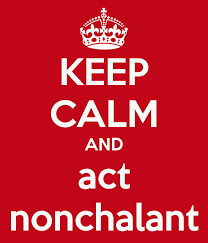记忆方法
将“nonchalant”拆分为“non-”和“chalant”。记住“non-”表示否定或不,而“chalant”来源于“challant”,意味着挑衅或有挑衅性的。想象一个“不挑衅”的(nonchalant)人,他显得轻松自在,即使面对挑衅也能保持冷静和不动声色。这种方法将单词拆分为两部分,分别代表其含义,有助于记忆。
以上内容由AI生成, 仅供参考和借鉴
中文词源
nonchalant 冷漠的,不热情的
non-,无,非,-chal,热的,词源同calorie.引申词义不热的,冷的,不关心的。
英语词源
- nonchalant
-
nonchalant: [18] To be nonchalant is etymologically ‘not to get hot under the collar’. The word comes from French nonchalant, an adjective formed with the prefix non- ‘not’ from the present participle of the verb chaloir ‘be concerned’. This goes back ultimately to Latin calēre ‘be hot’ (a relative of English calorie and cauldron).
=> calorie, cauldron, lukewarm - nonchalant (adj.)
- 1734, from French nonchalant, present participle of nonchaloir "be indifferent to, have no concern for" (13c.), from non- "not" (see non-) + chaloir "have concern for," ultimately from Latin calere "be hot" (see calorie). French chaland "customer, client" is of the same origin. Related: Nonchalantly.
权威例句
- 1. Clark's mother is nonchalant about her role in her son's latest work.
- 克拉克的母亲对自己在儿子最新作品中的角色漠不关心。
- 2. Denis tried to look nonchalant and uninterested.
- 丹尼斯竭力表现出漠不关心、不感兴趣的样子。
- 3. She defeat all her rival for the job with nonchalant ease.
- 她从容不迫地击败求职的所有竞争者.
- 4. He appeared nonchalant in court even when the judge ordered him to pay £1000.
- 在法庭上,甚至当法官命令他赔偿一千镑时,他仍然表现得若无其事.
- 5. It merely underlines our rather more nonchalant attitude to life.
- 这仅仅是更凸显了我们相当漠然的生活态度。

